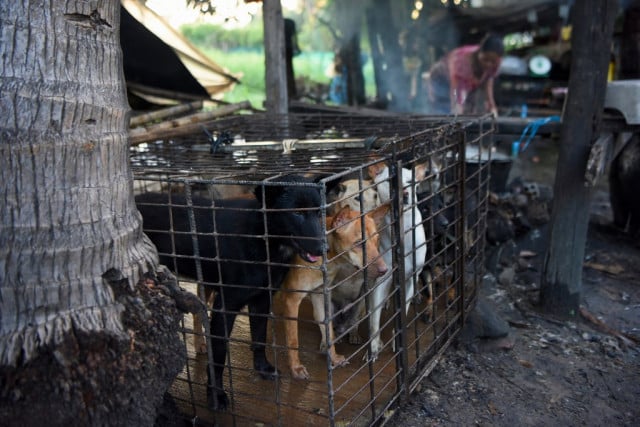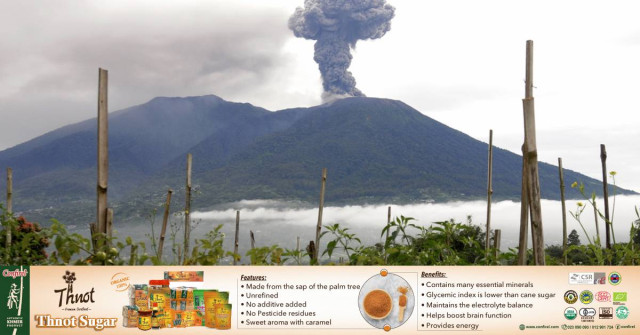Siem Reap Bans Dog Meat Trade

- Phoung Vantha and Gerald Flynn
- July 8, 2020 12:14 PM
While Siem Reap leads the charge, dog meat traders pose a huge public health impact—one that doesn’t appear to have been muted by COVID-19 as the mythical properties of dog meat prevail in the pandemic.
PHNOM PENH--On July 8, the Department of Agriculture, Forestry, and Fisheries of Siem Reap province announced that it would totally ban the sale of dog meat in a bid to end a cruel and dangerous industry. Any act of buying and killing a dog will be punishable under articles 112, 113 and 115 of the law, with offenders facing between two and five years in prison, as well as a fine of up to 50 million riel—roughly $12,200.
Siem Reap's Department of Agriculture, Forestry, and Fisheries director Tea Kim Soth said that eating dog represents a decline in human values, virtues, and risks spreading rabies, as well as other public health threats.
Kim Soth said the provincial authorities have warned known dog meat traders in the province and threatens to use the full extent of the law against those who continue after July 8.
“This is not just a problem in Siem Reap only, the traders also transport dogs to Phnom Penh and abroad,” he said.
Dog remains an affordable meat in Cambodia, averaging around 5,000 riel for a dish with rice, but is typically associated with drinking and more commonly consumed by men under the belief that it will increase their tolerance to alcohol. As such, dog meat has not just become a staple bar snack in some parts of Cambodia, but a panacea shrouded in myth and superstition.
A key proponent of Siem Reap’s new ban, Four Paws, is a global animal welfare organization that has been studying the dog and cat meat trade in Southeast Asia for some time. They published a report in February 2020 that showed as of August 2019 there were 21 restaurants actively serving dog meat in Siem Reap, along with five high volume holding areas where dogs were held illicitly and one dedicated slaughterhouse. Eight of the restaurants identified were within a 5 kilometer radius of the Angkor Wat temple complex.
As Kim Soth noted, the problem is not contained within Siem Reap. Four Paws uncovered 110 dog meat restaurants in Phnom Penh, each serving roughly four to six dogs per day—an estimated 200,000 dogs annually. Four Paws estimate that as many as 3 million dogs are killed, sold and eaten in Cambodia each year.
“To put this announcement into context, Four Paws has been working to investigate the dog meat trade in Cambodia since 2018,” said Dr. Katherine Polak, Four Paw’s head of animal care in Southeast Asia. “We were quite surprised at the magnitude of the trade, and brutality involved—most dogs end up in drowning pits or being hung to death.”
She went on to explain that Four Paws will be working with the Siem Reap provincial authorities, but also with the General Directorate of Animal Health and Production (GDAHP) who are responsible for Cambodia’s Animal Health Law and slaughterhouse regulation. Collectively, Dr. Polak said, they see Siem Reap as a potential model for wider-reaching legislation, but first they need to see how the ban will be enforced.
“GDAHP were actually quite shocked when we brought all of our investigative footage to them, I don't even know they knew that these places existed,” said Dr. Polak in a phone interview.
“There was this confusion because dogs fall kind of in this grey zone. They're not explicitly mentioned in the slaughterhouse regulation and animal health law as a livestock animal, so none of these slaughtering facilities can be registered, but then, who's responsible for shutting that down?” she said.
She went on to note that Four Paws and GDAHP are very close to signing a memorandum of understanding, one that could help put an end to Cambodia’s dog meat trade forever.
Breaking the Supply Chain
“Our plan with GDAHP, is we really want to target these high volume slaughterhouses. They've made it very clear that these are illegal, that these are unregulated, not certified and so if we can take those out of the supply chain, that really cuts off the supply to Phnom Penh,” said Dr. Polak.
For the people whose livelihoods depend on the dog meat trade, Four Paws operate a supplementary program, where they work with former dog meat traders in a bid to provide them new, sustainable means of making a living.
“Four Paws does believe in aiding those dependent on the trade for their livelihood, whenever possible to help both the dogs and local communities,” Dr. Polak explained.
The animal welfare group has successfully helped provide a livelihood conversion for one slaughterhouse in Takeo Province in October 2019. The trader went from killing more than 2,000 dogs a year to farming rice on a plot of land provided by Four Paws in exchange for the trader to make a lifelong pledge never to be involved in the dog meat trade again.
“Most of those restaurants just started in the last couple of years, so we know that it's increasing,” said Dr. Polak. “But let's say each restaurant employs a couple of people, but then we have high volume slaughterhouses where dogs drown in bulk, let's say they have a staff of 10 to 12 people, so the number of people adds up, but I also don't think it's massive—it’s not like the garment industry.”
Dr. Polak warned that the dog meat trade is brutally efficient, but the advantage to this is that there are not many people employed in the trade, making it easier for the government to shut down completely.
Referred to as ‘Sach Pises’ in Khmer, which translates literally to ‘special meat’—the consumption of dog is not thought to be inherent to Khmer culture, which has also enabled Four Paws and other animal rights activists to garner public and official support.
However, the Coronavirus Disease 2019 (COVID-19), far from having scared customers away from Cambodia’s dog meat vendors, appears to have actually enhanced it.
Dog Meat Thriving in the COVID-19 Pandemic
“We did send our investigative team out to see what was happening during the COVID-19 pandemic and what we found largely was that the trade had simply adapted,” said Dr. Polak.
Four Paws found that Cambodian dog meat restaurants were simply offering takeaway dog meat rather than sit-down meals, but more disturbingly—many vendors reported an increase in sales and customers due to the mythical healing and medicinal properties perceived in do meat.
“Our general consensus is that COVID-19 has not done much to slow this trade and if anything, it probably had the opposite effect, but it's hard to assess exactly,” admitted Dr. Polak.
Similarly, Four Paws operates a number of spay and neuter programs throughout Cambodia, specifically targeting pagodas. This is where it is believed that animals are often malnourished and in need of medical treatment.
“Right now the real issue is that the animals in the pagodas are starving, they don't have enough food to eat because the monks aren't getting enough food themselves,” said Dr. Polak, adding that Four Paws investigators have also now reported a surge in animals being snatched from pagodas.
“Do we normally see animals go missing from pagodas? Yes, because they are places where, it's easier to snatch animals and traders know this, but it seems to be from our interviews that it has increased in the pagodas,” she explained.
As such, Four Paws have appealed to the compassion of dog and cat meat traders, hanging up banners around the pagodas and providing monthly support programs to ensure that monks and nuns have the means to feed all the animals.
“The monks are really happy, they don't like their animals being stolen either, so it's challenging times all around,” Dr. Polak noted.
Cat meat consumption also occurs sporadically in Cambodia, particularly in more rural areas, but is far less popular than dog meat. However, the theft of cats from Buddhist pagodas for consumption is frequently reported.
A Public Health Catastrophe in the Making
Four Paws’ research from 2019 highlighted that 53.6 percent of Cambodians had eaten dog meat at some point in their lives, with gender being the dividing line—72.4 percent of male respondents had consumed dog meat, compared to just 34.8 percent of female respondents.
The lack of specific legislation to combat the dog and cat meat trade was concerning, particularly given the public health risks that these illicit trades pose.
“One of the reasons we really push this issue is it not only the animal welfare issue, that's obvious, but this is also a big public health risk due to rabies,” noted Dr. Polak. “Cambodia took a pledge to go rabies free by 2030, but they will never achieve that unless you curtail the dog meat trade, because it just undermines progress, you're killing all the dogs that you might vaccinate you're putting traders at risk, butchers at risk, consumers at risk, a lot of these dogs are rabies positive and that's the reality.”
Research from the Pasteur Institute dating back to 2017 suggests that Cambodia sees on average around 600,000 severe dog bites annually, but fewer than 5 percent of those bitten seek a rabies vaccination. In 2007, they found that 800 Cambodians died annually from rabies—which is 100 percent fatal without a vaccination after the bite. Estimates from the Pasteur Institute suggested that there are some 5 million dogs in Cambodia and of the 200 biting dogs that they test annually, nearly 50 percent were found to have rabies.
With some 608 million people potentially at risk, ASEAN in 2015 was forced to push back their initial pledge of being rabies-free by 2020—moving the deadline instead to 2030. While Dr. Polak noted that a national vaccination program would be the cheapest and easiest way to eradicate rabies from Cambodia, the dog meat trade is a major obstacle to this.
“Countries have pledged to take action to eradicate rabies, which is a very preventable disease, but the way that you prevent it is you vaccinate dogs—it’s super cheap—then you have to leave the dogs there because they form a barrier of protection,” she said.
Dr. Polak estimated that 99 percent of human cases of rabies in Asia are from dogs, but killing dogs for meat completely undermines any efforts to guarantee that Cambodia’s dogs remain free from rabies, but the gravity of the threat has helped whip up support within the Cambodian government.
“It is a huge public health risk and you'll never eradicate rabies unless you do something about this trade, so that's one of the real leverage points from a public health perspective—it’s so important,” she concluded.
A spokesman for the Ministry of Agriculture, Forestry, and Fisheries, Srey Vuthy could not be reach for comment at the press time.















